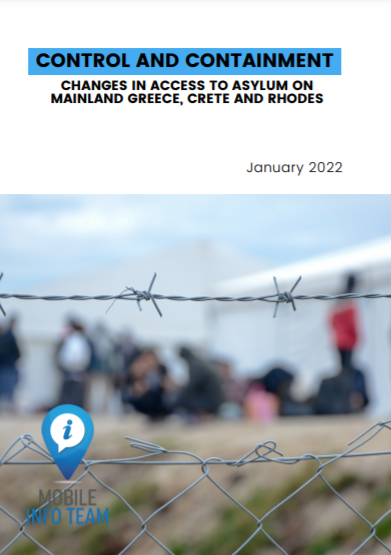Control and Containment
Changes in Access to Asylum on Mainland Greece, Crete and Rhodes
JANUARY 2022
“We are appalled that access to asylum on mainland Greece has yet again been blocked and concerned that this policy is less about fair and efficient access to asylum and more about the control and containment of people in need of protection.”
- Corinne Linnecar, Advocacy Manager at Mobile Info Team
At the end of November 2021, the Greek Government announced major changes in access to asylum for people seeking safety on mainland Greece, Crete and Rhodes. This policy saw the termination of the Skype pre-registration system for the registration of asylum claims. Instead, people seeking safety will now need to go to two reception centres on the mainland of Greece. However, such centres are not yet operational meaning that there has been no access to asylum for the majority of people on mainland Greece, Crete and Rhodes since 22 November 2021.
Temporarily blocking access to asylum not only leaves people in need of protection at risk, undocumented and destitute, it also violates national and international law. Even when such reception centres are opened, this policy will force people into de facto detention under prison-like conditions. Closed reception centres with policies of indiscriminate detention for men, women and children stand in contrast to any notion of protection, negatively impacting people’s mental health, autonomy, liberty and ability to rebuild their lives.
An increasing number of people have been entering Greece via the mainland over the past six years with 2021 being the first year that more people entered Greece via the mainland than the sea (53%). Our projected impact analysis forecasts that Greece would need to register between 30,160 and 44,000 people annually on the mainland alone. This policy change will therefore undoubtedly have a significant impact on the lives of tens of thousands of people seeking safety in Europe.
The abrupt change in policy has left people in an information void. There are currently no details available on how and when individuals can enter the asylum system. It is deeply concerning that the Greek authorities are denying people access to the asylum system without offering any interim measures or information on how and when people can expect to register their asylum claims.
Policies of exclusion and detention are detrimental to both people seeking asylum and to Greece. For people seeking asylum, these policies impede people’s ability to rebuild their lives, negatively impact people’s mental health and take away people’s autonomy and liberty. De facto detention also limits people’s ability to access essential services such as healthcare and education. For Greece these policies are also detrimental as they force people seeking asylum to stay reliant on the State for extended periods and prevent people seeking asylum from integrating and giving back to their new societies.




